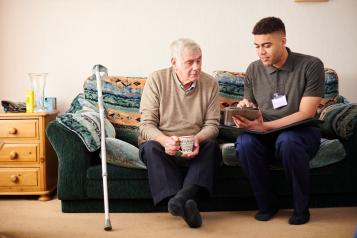The hidden demands of caring: urgent support needed
Debbie, 63, from Gloucestershire, is a carer for her husband.
Debbie's husband had a stroke five years ago, and he was in hospital for nine months. Debbie has been looking after him ever since he came home. She says she doesn't qualify for extensive social care support, but she can't afford to pay for anything but the most basic help.

Debbie's husband has full right-side paralysis and is double incontinent. He can feed himself to an extent but often needs help. Debbie prepares his meals and medications and helps him to eat and use the toilet. A carer visits four times daily to help move him from bed to other locations in the house, but Debbie is left alone to help as best she can for the rest of the day.
"We don't earn enough to pay for care, and we need help," she explains. "But for nearly five years now my requests for help have been refused."
The constant demands are taking a toll on Debbie's health and wellbeing. She has anxiety and suffered a heart attack in recent years. More social care support would take some of the weight off her shoulders, and some respite care would help her recharge her batteries.
"I'm exhausted, and I'm not in good health myself," she says. "It would be wonderful to have more help and a little space to breathe and do daily things like grocery shopping."
What's happening to make social care better?
Unfortunately, many people like Debbie and her husband are not getting the social care support they need to help them live independently.
The Government is planning a national commission to reform social care, while the Health and Social Care Select Committee gathers evidence to report on the cost of delays to adult social care reform.
Read about our recommendations to improve adult social care in England.


